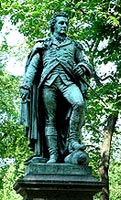
John Glover
On August 29th, 1776, George Washington faced certain defeat. Howe had been able to flank the Americans in Brooklyn, turning the Battle of Long Island into a rout. Washington was left with the remnants of his army on Brooklyn Heights, with the East River at his back and otherwise surrounded by the victorious British army. Only a north-easterly wind kept the British fleet from sailing up the East River and attacking the American forces from behind. The northeaster brought heavy rain. In the evening, the rain abated, replaced by a heavy fog.
Washington called on the 14th Continental Regiment commanded by John Glover to evacuate the army across the East River. Glover’s regiment was largely made up of fisherman and sailors and was called the “amphibious regiment” or simply the “web-footed Marbleheaders”. Over night in the rain and the fog, John Glover’s Marblehead Regiment saved Washington’s Army and the American revolution.
Starting an hour, before midnight Glover’s regiment started the evacuation, beginning with the sick and wounded, ferrying them through the fog, across the swift currents of the East River. Washington ordered that the campfires be kept burning through the night and that the pickets remain at their stations until the last minute. When the British finally realized that something was amiss the first soldiers in the American camp reported seeing the last American depart. They saw General Washington himself, the last man to board the last boat. By 7:00 AM all the boats had reached Manhattan. The American army in the field had been saved from what appeared to be certain defeat.
This would not be the last time that Glover’s Marbleheaders would save the revolution. Four months later in late December, Washington, having gone from defeat to defeat, constantly retreating from the English, had finally retreated into Pennsylvania, camping on the Delaware River across from the Hessian encampment in Trenton. Washington’s army already diminished force was schedule to go home on January 1st when their enlistments expired.
On Christmas evening, 1776 Glover’s Marbleheaders ferried Washingtons’ army across the Delaware at the height of blizzard. Washington’s victory at Trenton, followed immediately after by his attack on Princeton inspired the Americans and allowed Washington to recruit a second army which would fight for the remaining eight long bloody years of the war.
Glover’s Regiment was disbanded when their enlistments ran out. Most of the regiment are believed to have gone into privateering. Glover himself would go on to lead troops at the battles of Saratoga and Rhode Island and ended the war guarding the Hudson against British moves up the river from New York City.

Amazing history and inspiring! I have followed the Glover name from past to present. I hpoe that the values of such endearing souls isare not forgotten! Ty!
wow, hope to edit. (oop)
Pingback: Re-enactment of Washington’s Evacuation of Brooklyn This Saturday | Brooklyn Heights Blog
Is General John Glover the same John Glover the pirate?
I think they were different John Glovers, although I know very little of the pirate. If you have more information on the piratical Glover I would be interested in learning more.